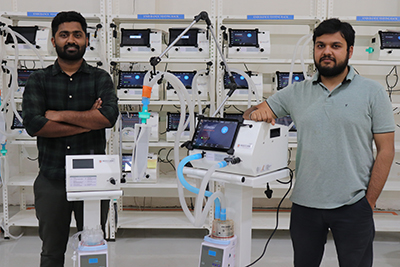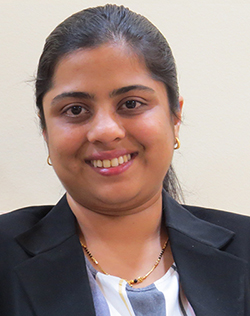
EDITION 8
Friday
July 2, 2021
Breathing Easy With Pune Start-Up’s Innovation

Nikhil Kurele & Harshit Rathore
Sometimes working for a greater good can bring even greater rewards for you. Noccarc Robotics was founded in 2017 by two young engineers Nikhil Kurele and Harshit Rathore. Starting out with the aim to build robots to clean solar panels, business was doing so-so. Says Nikhil, “Our robots were doing a great job, but the industry was taking its time to pick up.” And then a little virus changed life for the whole world.
“There was a lockdown and our staff of 21 people had left for their hometowns. Harshit and I share a flat so we stayed put in Pune.” The pandemic placed new urgent demands on society. “Suddenly oxygen and ventilators were a dire need. Since we were doing nothing, we thought why not use our skills to help hospitals with ventilators.”
The making of the ventilator
But how could a robot-making company venture into medical equipment? Says Nikhil, “well we looked at it rather simplistically. What is a robot? It’s a gadget that uses mechanical and electronic engineering to do a task. We were already manufacturing complex systems. So, we thought that a ventilator must be quite similar, in the sense you have to deliver oxygen to the lungs using mechanical and electronic engineering.”
Besides simplistic, it was also very daring. The two had not even seen what a ventilator looked like. “Our mentor and investor Sudhir Mehta set up a ‘view’ for us at Sancheti hospital. We saw what a ventilator does and after two hours of studying it, we decided that we can make it.”
Seems audacious, but 72 hours later proved that they were more than just guts. “We had a PoC ready and since we were being mentored by IIT Kanpur as well, they aided us with sourcing of materials, touching base with alumni, who later helped us with the funding too.”
“What does a ventilator do? It supplies a fixed amount of air and oxygen to the lungs. This is delivered by constant volume and pressure. Of course, this can change depending on the doctor who will set the parameters. If you break this up it’s quite elementary. The kind of systems our robot had controlled many more devices. Five to seven motors and multiple sensors.
“Here we had two devices to control and two elements – pressure and volume. But there were hundreds of settings…. the volume at which it should stop, increase, etc. What we had to work on was the planning of the mathematics. The control part was more difficult than designing a ventilator. This we do through firmware as it gives very good precision.”
And how precise was it? Says Nikhil, “It is as good as any international quality ventilator. We had it tested at DY Patil, tested against multiple brands and it has proven to be as good as any global brand.” They’ve even filed two patents.
From the very beginning the duo had decided that they would not put out their ventilator without having it tested by global standards. Says Nikhil, “about two or three years ago it was possible to make a ventilator or any other medical equipment and get it sold without meeting global standards. The Govt has now put in place rules that require you to do this. So early on we were sure that our product would be world class.”
Making a world class ventilator for the very first time by people making solar panel cleaning robots would seem like a tall order. But Noccarc founders knew exactly what they wanted to do. “We wanted to make a world-class ventilator that could help the Covid patients. And to do that we understood that you need the best spare parts which are available only in Europe and the US.” Again, it was IIT Kanpur that helped them source these parts.
When time and money are of the essence
Noccarc had developed a PoC in 72 hours and in 84 days they had their product ready for the market. “On July 15 after getting our ventilator certified by the GoI we were ready to provide ventilators.” In the first wave they sold 300 ventilators.
And when the second wave hit the country Noccarc had already established a good supply chain, moved to a new factory, and had a capacity to manufacture 105 ventilators per day!
Their ventilator costs Rs 4.5 lakhs while a comparable imported one costs Rs. 7.5 lakhs. Says Nikhil, “the components are imported and that increases the cost. If they too were made in India, we could bring down the cost further.” So far, they have supplied 3000 ventilators.
What the future holds:
While all Nikhil and Harshit had thought of while venturing into making ventilators was how to help Covid patients, their business made a happy pivot. “Our aim was to do what we could to help people who needed oxygen. And we were doing nothing at the time. So, we thought why not use our time and knowledge. At the back of my mind, we thought that if we succeeded then we’d make a name and that would perhaps help our business raise further funds.”
The ventilator venture cost them Rs 4 Cr which they got through CSR funds. “We were lucky that people noticed our work. When we developed our PoC, Professor Govind Rajan of the UC Irwin college in USA spoke of our work and word got around and companies like ICIC Securities, Standard Chartered, InfoEdge together invested Rs 4 Cr in our initiative. We bought a new place, hired more people. Today we have more than 130 employees.”
Speaking of the way forward for Noccarc, Nikhil says that “Medtech is where we aim to focus for the next few years. When we founded the company medtech and cleantech were on our minds but cleantech took precedence. But after this Covid experience we see a bigger opportunity in medtech.”
“We aim to get into ICU care products. We want to do everything in the ventilation devices range. Adult, pediatric and even neonatal ventilators. We want to offer our products to other countries as well, Latin America, African countries. Later we plan to evaluate cardiac devices market.”
So, what happens to the solar panel robots? “Well, we will do that as well. But as of now the situation for our panel cleaning robots is not very good as we are not allowed to function on account of Covid.” But since medtech comes under essential services, the factory continues to function despite intermittent lockdowns. After all, working for a greater good ended happily for Noccarc Robotics.
TiE Nurture:
Worldwide the success rate for start-ups is 10%. But at TiE Pune’s Nurture Accelerator program it is 39%. While our numbers tell their own story, we showcase here our mentees who tell how TiE helped their business.


Payal Doshi
Payal Doshi who founded Prime Softech Solutions Pvt. Ltd. and is its MD shares her experience:
What does your company do?
Prime Softech Solutions Pvt. Ltd. is a software product company with 2 products, MyClassAdmin and Prexam, in Edu-tech domain targeting educational institutions and students respectively, and 3rd product Autofice in Small Office Automation software specially designed for services businesses.
What made you join this program?
I had joined the program to learn techniques for systematic growth of my business.
How has the Nurture Accelerator helped your business?
Nurture Accelerator has helped me understand how to build systems and processes for the business required for growth. Right from business hygiene to market expansion and networking strategies everything has been taught with a systematic approach. Moreover, personal mentoring sessions have given us a chance to discuss individual business and gain third person’s perspective on what we are missing on and improve over it. Also, it has opened up a huge network of senior professionals for us to learn from.
What were the three most important learnings?
- Being an engineer, marketing was not so easy for me. Through TiE I have learned how to design and develop my value proposition in the industry.
- Second most important learning is, whatever we decide to do, our vision and mission, should be shared with all the employees of the company only then everyone can take efforts in that direction.
- To have a fixed written down goal for short term as well as long term. Only then we can design/develop the path to reach the goal.
What’s your message to other founders?
Most of the founders are technically sound, but running a company needs much more than that. You have to learn and master many such skills from marketing to HR management. As we learned at Nurture, there are systematic methodologies of growth that will work for everyone if applied with correct assumptions. If we as founders are open to learn and adapt these techniques, it will penetrate deeper in the culture of our venture. And this will facilitate over-all growth.
Contact us if you have a story to tell: rashmi.ghosh@tiepune.org

